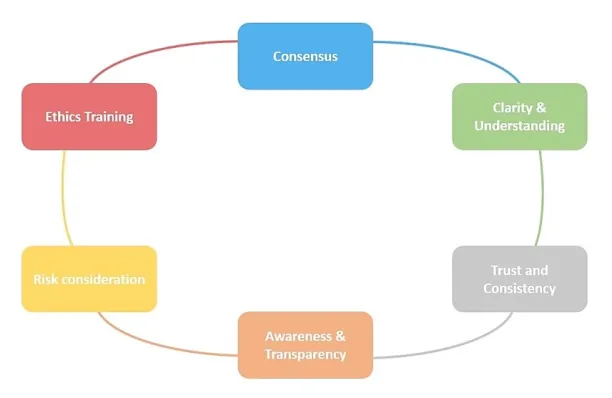
Introduction to Data Privacy in Marketing
In today’s digital marketing landscape, data has become a vital asset.
With companies increasingly relying on personal data to understand consumer preferences, behavior, and needs, the management and protection of this data have become essential responsibilities.
As the importance of consumer data grows, so does the expectation for marketers to handle it responsibly, ethically, and legally.
Data privacy laws, particularly the General Data Protection Regulation (GDPR), have changed how companies collect, store, and use data.
These regulations emphasize consumer rights and impose strict rules to protect personal information.
Brands that align their practices with privacy laws not only avoid legal issues but also build trust with their customers, creating long-term relationships based on transparency and respect.
For marketers, understanding and adhering to these regulations is critical.
By implementing robust data protection strategies, businesses can ensure compliance, uphold ethical standards, and build a foundation of trust with their consumers.
Understanding GDPR and Key Data Protection Regulations
The General Data Protection Regulation (GDPR), introduced by the European Union in 2018, remains one of the most influential data privacy laws.
It requires businesses to obtain explicit consent before collecting personal data, to notify consumers of their data rights, and to securely manage and protect the data they gather.
The GDPR’s reach is extensive, impacting not just companies within the EU but any company that handles the data of EU citizens.
GDPR enforces several key principles for data handling, including transparency, accuracy, data minimization, and purpose limitation.
Marketers must follow these principles by ensuring that data is collected fairly and only for specified, legitimate purposes.
In addition to GDPR, other regions have enacted similar regulations, such as the California Consumer Privacy Act (CCPA), which focuses on consumers’ rights to know, delete, and opt out of the sale of their data.
Compliance with GDPR and other data privacy laws is crucial.
Not only does it protect businesses from fines, but it also ensures a commitment to ethical marketing.
Understanding these regulations allows marketers to responsibly manage data, build trust, and offer better protection for their customers.
Consumer Data Rights in Marketing
In the age of data-driven marketing, consumer data rights have become central to privacy regulations.
Under GDPR and similar laws, consumers are granted several key rights regarding their personal information.
These include the right to access, correct, delete, and even restrict the processing of their data.
Consumers can also object to certain uses of their data, such as personalized advertising, providing them with greater control over their information.
Transparency is essential in respecting these rights.
Marketers must clearly explain how data is collected, processed, and stored, ensuring that consumers understand their choices.
For example, websites often display privacy notices or pop-ups informing users of data collection practices and giving them options to opt in or out.
In addition, companies should consider making data access easier for consumers.
Allowing individuals to review or request changes to their data promotes trust and aligns with privacy regulations.
By empowering consumers with control over their data, marketers not only fulfill legal obligations but also foster an environment of transparency and accountability.
Marketing Best Practices for Ethical Data Usage
Adhering to ethical data practices is fundamental in modern marketing.
Marketers should adopt a “privacy-first” mindset, ensuring that consumer data is handled responsibly from collection to storage.
Only essential data should be collected, and any unnecessary or outdated data should be securely disposed of to minimize risks.
Data anonymization is another practice that enhances privacy.
By removing personally identifiable information (PII) from datasets, marketers can still gain valuable insights without compromising individual privacy.
Additionally, encryption, data masking, and access controls are essential strategies to keep sensitive information safe.
Regular audits can further enhance ethical data practices.
These audits allow companies to identify areas of improvement and ensure compliance with privacy laws.
Through responsible data management, marketers can align their practices with consumer expectations and foster a culture of ethical data use.

User Consent and Data Collection in Marketing
User consent is a core component of GDPR and other data privacy laws.
Obtaining consent ensures that consumers are aware of, and agree to, the ways in which their data will be used.
For marketers, clear communication is key—consumers should understand why their data is collected and how it will benefit them, whether through personalized offers, relevant content, or other marketing strategies.
Marketers should use explicit opt-in methods rather than pre-checked boxes, which ensures that consent is active and voluntary.
Additionally, providing easy options for users to withdraw consent at any time is equally important in respecting consumer choices and maintaining compliance.
By implementing clear, consent-based data collection methods, marketers foster trust and transparency.
When consumers have confidence in how their data is handled, they are more likely to engage positively with brands, leading to stronger, trust-based relationships.
Data Security Strategies to Prevent Breaches
In an era where data breaches are increasingly common, data security is paramount.
Breaches can result in severe legal repercussions, loss of consumer trust, and significant financial damage.
Marketers, therefore, need to adopt robust security measures to protect consumer data.
Encryption is a powerful tool in data security, as it makes sensitive information unreadable to unauthorized users.
Firewalls and intrusion detection systems are also essential, as they provide additional layers of protection against cyber threats.
Regular security training for employees further strengthens data security by ensuring that team members are aware of best practices.
Regularly updating and patching systems reduces vulnerabilities, minimizing the risk of unauthorized access.
With proactive security strategies, marketers can prevent breaches and safeguard consumer data, promoting a secure, trustworthy marketing environment.
Privacy by Design: Integrating Privacy into Marketing Practices
Privacy by design is an approach that incorporates data protection into every aspect of data handling, from the initial collection to its storage and use.
This proactive approach ensures that privacy is a central consideration, reducing the risk of data misuse or loss.
Data minimization is one principle of privacy by design, ensuring that only necessary data is collected.
Purpose limitation is another important aspect, as it specifies that data should be used only for its intended purpose.
Additionally, regular privacy assessments help maintain compliance and protect consumers.
By adopting privacy by design, marketers demonstrate a commitment to protecting consumer data from the ground up.
This approach enhances trust and aligns with both legal requirements and consumer expectations, fostering positive relationships based on respect for privacy.
Navigating Cross-Border Data Transfers in Marketing
As data flows across borders in the global economy, cross-border data transfers present unique challenges for marketers.
GDPR and similar regulations require that data transferred outside certain regions must be protected by equivalent privacy standards, ensuring consumer data security on a global scale.
Marketers must be cautious when working with third-party partners outside their region, ensuring that these companies uphold data privacy standards.
Using secure transfer protocols and data encryption is essential for maintaining security during cross-border transfers.
By understanding the legal requirements and technical safeguards, marketers can handle international data responsibly.
This approach not only ensures compliance with privacy laws but also builds consumer trust in a brand’s global data practices.
Building Customer Trust through Transparency
Transparency is at the heart of consumer trust.
When customers understand how their data is being collected, stored, and used, they are more likely to feel secure and confident in their relationship with a brand.
Providing clear, accessible privacy policies is one way to achieve transparency.
These policies should be easy to understand, outlining how data will be used and giving consumers control over their information.
Additionally, brands should offer easy access to customer support for any privacy concerns, further establishing an open line of communication.
Incorporating transparency into marketing practices builds a foundation of trust and loyalty.
Consumers who feel valued and respected are more likely to engage positively with a brand, driving both retention and long-term loyalty.
This comprehensive guide to data privacy in marketing provides an understanding of GDPR compliance, ethical data handling, and best practices for protecting consumer information.
Marketers who follow these principles can maintain compliance with data protection laws, foster customer trust, and create a secure, privacy-respecting marketing environment.







